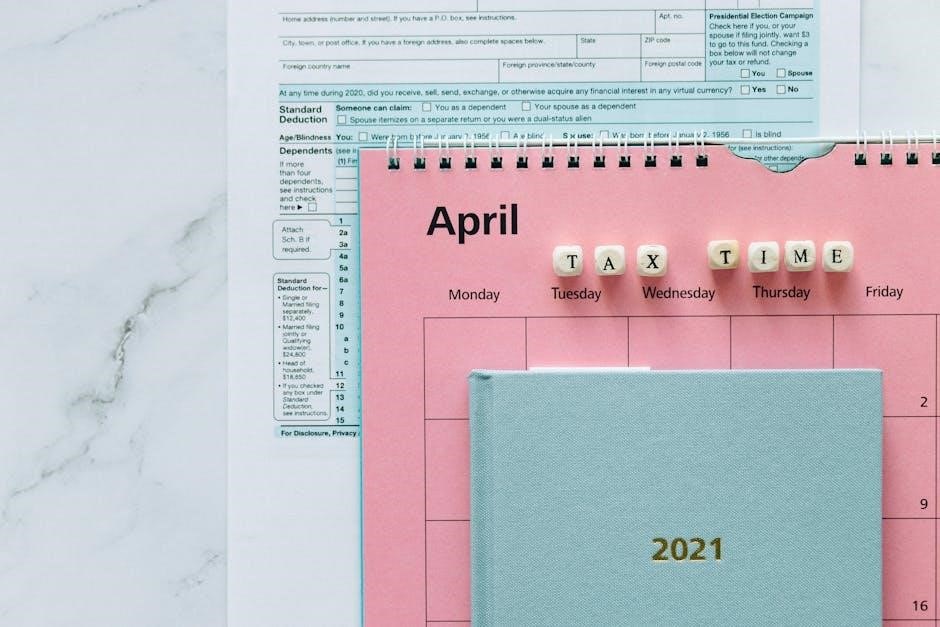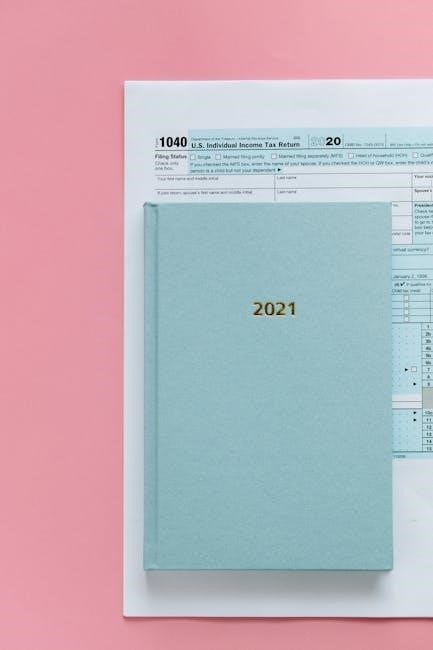Understanding the Deadline for Filing New Jersey Estate Tax Return
All New Jersey Estate Tax returns must be filed within nine months of the decedent’s death. Late filing may result in penalties and accrued interest.
Taxes due must also be paid within this period to avoid additional charges. The NJ Tax Portal offers electronic filing options for convenience and efficiency.
1.1. Key Deadline: Nine Months from the Date of Death
The deadline for filing a New Jersey Estate Tax Return is nine months from the decedent’s date of death. This period includes both filing the return and paying any tax owed.
Failure to meet this deadline may result in penalties and interest on the unpaid tax. Timely filing is crucial to avoid additional financial obligations for the estate.
1.2. Importance of Timely Filing and Payment
Timely filing and payment are critical to avoid penalties and interest on the estate tax. Late submissions may delay estate administration and incur additional costs.
Meeting the deadline ensures compliance with state tax laws and prevents further financial burdens on the estate. Accurate and prompt filing helps maintain the estate’s integrity and avoids legal complications.
Determining Whether You Need to File a New Jersey Estate Tax Return
Filing requirements depend on the decedent’s residency and the gross estate value. Estates exceeding specific thresholds must file a return with the state.
Non-resident estates with New Jersey-sourced income may also need to file. Always verify the latest state guidelines for accurate compliance.
2.1. Residency Status of the Decedent
The residency status of the decedent plays a crucial role in determining filing requirements. If the decedent was a New Jersey resident at the time of death‚ their estate may be subject to state estate tax. Residency is typically determined by domicile‚ meaning where the individual intended to permanently reside.
Non-resident decedents generally do not owe New Jersey estate tax unless they hold assets with a New Jersey nexus‚ such as real property. Always verify residency status before proceeding with filings.
2.2. Gross Estate and Adjusted Taxable Gifts Threshold
The gross estate includes all assets‚ such as real estate‚ stocks‚ and personal property‚ minus debts and exemptions. Adjusted taxable gifts are gifts made during the decedent’s lifetime that count toward the estate tax. If the gross estate plus adjusted taxable gifts exceeds a certain threshold‚ a New Jersey Estate Tax Return (Form IT-Estate) must be filed. This threshold applies to resident decedents who died on or after January 1‚ 2017.
Understanding the Tax Basis for New Jersey Estate Tax
The tax basis for New Jersey estate tax is generally the fair market value of assets as of the decedent’s death‚ excluding certain exemptions and deductions.
3.1. Gross Estate Calculation
The gross estate includes the fair market value of all assets owned by the decedent at death‚ such as real estate‚ securities‚ and personal property. It also encompasses certain transfers made during the decedent’s lifetime‚ like gifts. The total is reported on Form IT-R or Form 706‚ ensuring all taxable assets are accounted for accurately. This valuation determines the tax basis for estate calculations.
3.2. Adjusted Taxable Gifts and Exclusions
Adjusted taxable gifts include certain lifetime gifts made by the decedent‚ excluding those protected by the annual exclusion or marital deduction. Gifts exceeding the federal gift tax exemption are added to the gross estate. Specific exclusions‚ such as transfers to charitable organizations or qualified spousal transfers‚ are not subject to taxation. These adjustments are calculated using Form 706 and must be accurately reported to determine the taxable estate value.
Filing the New Jersey Estate Tax Return
The estate tax return must include Form IT-Estate‚ along with required documents like the will‚ appraisals‚ and inventory. Electronic filing is available via the NJ Tax Portal for convenience and accuracy.
4.1. Required Forms and Documentation
When filing the New Jersey Estate Tax Return‚ Form IT-Estate is mandatory. Include a copy of the will‚ trusts‚ appraisals‚ and Form 706. Attach only one copy of each document. Ensure checks are stapled to the payment voucher and placed on top. Executors must provide the decedent’s Social Security number and birthdate or the estate’s federal ID number. Necessary forms and instructions are available on the NJ Tax Portal or from the Division of Taxation.
4.2. Step-by-Step Filing Process
Begin by gathering all required documents‚ including Form IT-Estate‚ wills‚ trusts‚ and appraisals. Log in to the NJ Tax Portal or create an account if needed. Fill out the form accurately‚ ensuring all fields are completed. Upload the necessary attachments securely. Review the submission for errors. Once satisfied‚ submit the return electronically. Print or save a confirmation for records. Keep copies of all submitted materials for future reference.

Calculating the New Jersey Estate Tax
Calculate the tax by applying the applicable exclusion amount to the gross estate and adjusted taxable gifts‚ then subtract deductions and credits as permitted by law.
5.1. Applying the Applicable Exclusion Amount
The applicable exclusion amount is subtracted from the gross estate and adjusted taxable gifts to determine the taxable estate. For New Jersey‚ this amount aligns with federal estate tax exemptions. Ensure accurate calculation by referencing the IRS guidelines for the year of the decedent’s death. Proper application of this exclusion helps minimize the taxable estate and potential liabilities. Always verify the most current figures to ensure compliance with state and federal regulations.
5.2. Deductions and Credits Available
Deductions for funeral expenses‚ debts‚ and administrative costs can reduce the taxable estate. Credits‚ such as the inheritance tax credit‚ may also lower the estate tax liability. Proper documentation is essential to claim these deductions and credits accurately. Consulting official New Jersey tax resources ensures compliance with specific regulations and maximizes potential tax savings.
Payment Options and Penalties
Payments can be made via check‚ electronic funds transfer‚ or credit card. Late payments incur interest and penalties‚ emphasizing timely submission to avoid additional fees.
6.1. methods of Payment
Payment options include checks‚ electronic funds transfer‚ or credit card. Checks must be stapled to the payment voucher and made payable to “New Jersey Inheritance and Estate Tax.” Electronic payments offer convenience and immediate confirmation. Ensure timely payment to avoid penalties and interest. The NJ Tax Portal provides detailed guidance on payment methods and required documentation for a smooth process.
6.2. Consequences of Late Payment
Late payment results in interest accruing on unpaid taxes. Penalties may also apply‚ increasing the total amount owed. Failure to meet deadlines can delay processing and lead to further actions. Timely payment ensures compliance and avoids additional charges. The NJ Division of Taxation emphasizes the importance of meeting deadlines to prevent complications and ensure efficient estate settlement.
Electronic Filing and Online Services
New Jersey offers electronic filing through its Tax Portal‚ enabling efficient submission of estate tax returns. This service provides faster processing and secure transactions for taxpayers.
7.1. New Jersey Tax Portal Features
The NJ Tax Portal offers streamlined filing‚ real-time account access‚ and secure payment options. Taxpayers can submit returns‚ track refunds‚ and manage notices online. Enhanced features include electronic payment options and access to prior-year returns‚ making tax management efficient and user-friendly for estates and their representatives.
7.2. Benefits of Electronic Submission
Electronic submission of the NJ Estate Tax return offers convenience‚ accuracy‚ and faster processing. It reduces errors‚ provides immediate confirmation‚ and allows for secure payment options. Taxpayers can also access their accounts and prior filings‚ streamlining the process and ensuring compliance with state tax requirements efficiently.

Inheritance Tax vs. Estate Tax in New Jersey
New Jersey distinguishes between estate and inheritance taxes. The estate tax applies to the deceased’s assets‚ while the inheritance tax is levied on beneficiaries’ shares.
The estate tax is based on the gross estate’s value‚ whereas the inheritance tax considers the beneficiary’s relationship to the decedent and the amount received.
8.1. Understanding the Difference
The estate tax in New Jersey is calculated on the deceased’s total assets before distribution‚ while the inheritance tax applies to the shares beneficiaries receive. The estate tax focuses on the decedent’s wealth‚ whereas the inheritance tax is based on who inherits and how much they receive. This distinction is crucial for accurate tax reporting and compliance with state regulations.
8.2. How They Interrelate
The New Jersey inheritance tax applies to beneficiaries’ shares‚ while the estate tax is based on the decedent’s total assets. Historically‚ the inheritance tax acted as a credit against the estate tax‚ ensuring the estate paid only the higher of the two. However‚ since the estate tax was phased out‚ the inheritance tax now applies independently‚ focusing on the distribution of assets to heirs.

Fiduciary Responsibilities and Gross Income Tax Return
The fiduciary must file Form NJ-1041 if the estate’s gross income exceeds $10‚000‚ ensuring timely reporting of income and compliance with state tax obligations.
9.1. Filing Form NJ-1041
Fiduciaries of estates or trusts must file Form NJ-1041‚ the New Jersey Gross Income Tax Fiduciary Return‚ if the estate’s gross income exceeds $10‚000. This form reports income‚ deductions‚ and credits. It is crucial to ensure accuracy and timeliness to avoid penalties. The form must be submitted annually‚ reflecting the estate’s financial activity for the tax year.
9.2. Income Threshold for Filing
The fiduciary must file Form NJ-1041 if the estate’s gross income exceeds $10‚000. This threshold applies to both resident and non-resident estates. Executors or administrators are responsible for ensuring the return is filed when required. Failure to meet this threshold may result in legal consequences or penalties. Accurate reporting of income and deductions is essential to comply with New Jersey tax regulations.

Amending a Previously Filed Estate Tax Return
To amend a return‚ file Form IT-Estate with corrected information. Include documentation supporting changes. Amendments must be filed promptly to avoid penalties and ensure accurate tax assessment.
10.1. When and How to Amend
An amendment is necessary if errors or omissions are discovered in the originally filed return. Use Form IT-Estate to correct inaccuracies or provide additional information.
Submit the amended return with supporting documentation to the NJ Division of Taxation. Ensure all corrections are clearly marked and properly signed to avoid processing delays or penalties.
10.2. Required Documentation for Amendments
When amending a New Jersey Estate Tax return‚ include a completed Form IT-Estate with corrections highlighted. Attach updated or additional documentation‚ such as appraisals‚ wills‚ or trust agreements‚ to support changes.
Submit detailed explanations for each amendment and ensure all necessary signatures are present. Include a copy of the original return and any relevant IRS forms‚ such as Form 706‚ if applicable.
Special Considerations for Non-Resident Estates
Non-resident estates with income from New Jersey sources must file a fiduciary return. Ensure accurate reporting of all NJ-derived income to avoid penalties or delays.
11.1. Filing Requirements for Non-Resident Estates
Non-resident estates must file a New Jersey Gross Income Tax Fiduciary Return (Form NJ-1041) if they receive income from New Jersey sources. The filing threshold is $10‚000 or more in gross income. Additionally‚ a New Jersey Estate Tax Return may be required if the estate exceeds the taxable threshold‚ ensuring compliance with state tax regulations. Proper documentation and timely submission are essential to avoid penalties and ensure accurate reporting of all New Jersey-derived income.
11.2. Income from New Jersey Sources
Non-resident estates must report income derived from New Jersey sources‚ such as real estate‚ businesses‚ or investments located within the state. Even if the decedent was not a New Jersey resident‚ income from these sources is subject to state tax. Proper documentation and accurate reporting of such income are essential to ensure compliance with New Jersey tax laws and avoid potential penalties or disputes.
Additional Resources and Forms
Visit the New Jersey Tax Portal for essential forms‚ instructions‚ and tutorials. Key resources include Form NJ-1041‚ IT-Estate‚ and the NJ-1040 filing guide. Contact support for assistance.
12.1. Essential Forms and Instructions
Key forms include the NJ-1041 for fiduciary returns‚ IT-R for inheritance tax‚ and Form IT-Estate for estate tax. Download these from the New Jersey Tax Portal‚ along with detailed instructions and guides. Additional resources like Form NJ-1040 for individual returns and federal Form 706 are also available. The portal offers tutorials and step-by-step filing assistance to ensure compliance and accuracy.
12.2. Contact Information for Assistance
For assistance‚ contact the New Jersey Division of Taxation at (609) 292-5033. Visit their office at 50 Barrack Street‚ Trenton‚ NJ 08695. Phone lines are open Monday to Friday‚ 8:30 AM to 4:30 PM EST. Additional support is available through the NJ Tax Portal’s help section‚ offering tutorials and real-time assistance for filing and payment inquiries.
